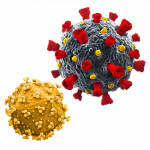People who use marijuana routinely over long periods do not apparently suffer from an exacerbation of HIV’s negative effects on the brain, including inflammation and cognitive deficits, Reuters Health reports.
A recent study published in the Journal of Neuroinflammation did find, however, that regardless of an individual’s HIV status, chronic marijuana use was associated with abnormalities in a portion of the brain that connects to regions that govern verbal memory and emotion.
In the study, Linda Chang, MD, of the University of Maryland School of Medicine in Baltimore, and her colleagues studied 44 people with HIV, including 23 people who used marijuana minimally or not at all and 21 who used the drug chronically. They compared these groups with 46 HIV-negative people, including a respective 24 and 22 people in each of the two marijuana-use categories.
Chronic marijuana use was defined as using the drug more than three times per week for more than two years.
The average age of the participants was about 45, and some 90% were men.
The participants were tested for their neuropsychological performance in seven categories and also received brain scans using what’s known as diffusion tensor imaging.
The scans revealed unsurprising findings that living with HIV was associated with negative changes to key brain structures as well as poorer cognitive performance on various fronts.
However, chronic marijuana use was not associated with an exacerbation of these deleterious effects of living with the virus. Regardless of the participants’ HIV status, those who used marijuana chronically had similar cognition compared with those who used the drug only a little or not at all.
These findings may not be applicable to adolescents or younger adults, considering research indicating that marijuana use in those age groups may be more inclined to harm the brain compared with older adults.
To read the Reuters Health article, click here.
To read the study, click here.







Comments
Comments